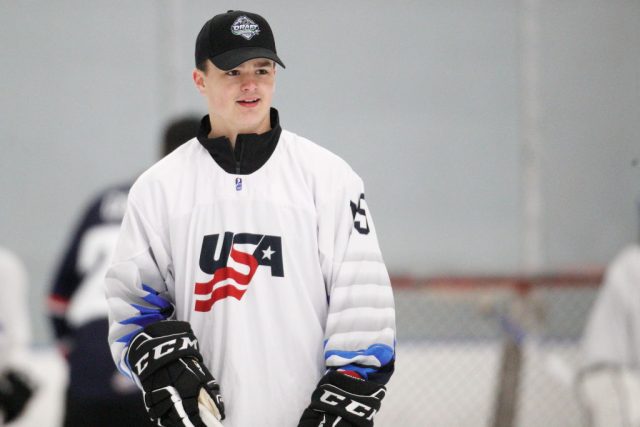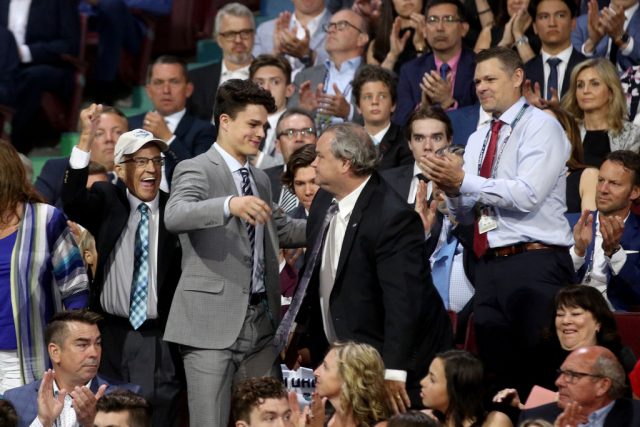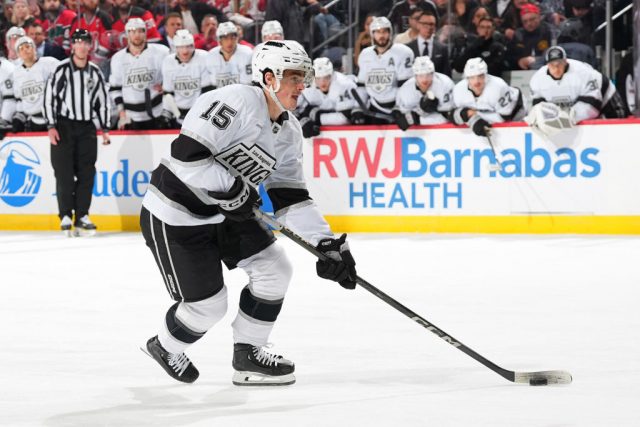For many years Real Turcotte was the heart, soul and do-everything man for what was widely acknowledged to be the largest collection of hockey schools in America.
Real Turcotte is considered by many a legend in the grassroots hockey community and among the many players who learned the finer points of the game at Turcotte schools were Hall of Famers Mike Modano, Pat Lafontaine and Marty St. Louis.
Real Turcotte’s influence can be seen up and down the Turcotte family tree.
One of Real Turcotte’s sons was Alfie Turcotte, a long-time NHLer and now a coach and skills instructor of some esteem himself. Alfie’s younger brother, Jeff, played at the major junior and minor pro level and is also a lifetime skills instructor with ties to youth hockey in California.
And then there is Alfie Turcotte’s youngest son, LA Kings forward Alex Turcotte, the 5th overall pick in the 2019 draft.
Ah, you say, so that explains it. It’s kind of a DNA thing, hockey in the blood.
And you would be right. To a point.
But Alex Turcotte doesn’t think of genes when he thinks of his late grandfather Real. He doesn’t think about cause and effect and how his grandfather’s successful hockey career may have been a catalyst to his own burgeoning NHL career.
No, when Alex Turcotte thinks of Real Turcotte he thinks of a man who was his best friend, a father figure and a guiding force in a life that has at times been more than a little complicated.
“I’d love to talk about that. He was my best friend growing up, pretty much,” Turcotte said during a recent conversation.
When Turcotte was 10 he moved from Illinois to the Detroit area and his grandfather became a constant figure in a life that sometimes lacked for stability.
Alfie Turcotte had retired from a playing career that saw him play 112 NHL games along with stops in Europe and at the minor pro level in North America and move on to other hockey endeavors.
For periods of time Real and his wife became stand-in parents for Turcotte. Whether it was hanging out in the family pool or helping with homework or working with him at hockey practices and everything in between, Real and his wife were there.
“He was my role model growing up. He was just a really happy guy. Super outgoing, super friendly,” Turcotte recalled. “That’s just him as a person. He was awesome to be around. He was hilarious.”
“I don’t really think too much about the camps. You can kind of just reminded me of it. Which is crazy because I was there all the time,” Turcotte added. “He was way more than that. Obviously, he was very successful in the hockey world. He started from scratch. He did everything on his own, I guess you could say. Which is very inspiring and cool. I just spent so much time with him. Since I was 10 to 18, I felt like I was just around him all the time.”
For Real Turcotte it was never about the wins or the losses it was about the foundations of the game, the skill and getting enjoyment from improving on those skills.
There were hockey lessons to be sure, but more importantly, life lessons. And as it turns out life lessons that were important for Turcotte to learn at an early age.
“When I was younger, I kind of had attitude problems,” Turcotte admitted. “If something wouldn’t go my way, I was pouting, crying, whatever.”
In some ways Turcotte’s story is a cautionary one about the pressures that can be applied to young athletes and why so many leave competitive sport just as they are reaching their formative years.
At a fairly early age Turcotte found himself in the strange position of being a dominant youth player, almost always playing up an age group, and yet not particularly liking what he was doing. Some of that might have been playing for his dad, the former NHLer who demanded much from his talented son.
“I guess my dad would be a little bit harder on me at the time,” Turcotte acknowledged.
“Long story short, I just wasn’t having fun at the time,” Turcotte said. “I was also a kid, so there could just be a lot of reasons. I was playing a lot of hockey. That’s all I was doing, so it could have been burnout or whatever.”
On advice from his grandfather, Real, Turcotte ended up leaving a higher profile AAA team in the Detroit area and going to a smaller Michigan program, Orchard Lake.
“My grandfather would be there for me and make me feel a little more comfortable. Just not worrying about scoring and all that stuff when you’re a kid. If you don’t play well, it’s okay. Just work hard, have fun,” Turcotte said. “That’s kind of what he taught me. He taught me to enjoy hockey again.”

Photo by Kevin Light/Getty Images
One of the coaches in Orchard Lake was Lou Melone who had been coached by Real Turcotte when Melone was growing up. Melone and his brother had been close with Alfie and his brother Jeff when they were young.
Bob Mancini, who would champion the groundbreaking USA Hockey method of teaching grassroots hockey known as the American Development Model (ADM), was also part of the coaching group in Orchard Lake.
“Those two were awesome,” Turcotte said of Mancini and Melone. “They just wanted me to go out there, work hard, and have fun. I think for whatever reason, I felt like there was a lot of pressure. It’s crazy to think. I was a kid; really young. I don’t know. I just felt like I was going to the rink, and it was stressful. I just didn’t know how to deal with it. You’re so young. You’re supposed to be having fun, whatever.”
“I went and played for those two. It was awesome. We worked on skills all the time in practice,” Turcotte recalled. “Practices were fun. We were playing mini-games. It was kind of like the start of that. It was about development and stuff.”
Funny how it works, isn’t it?
The Orchard Park team wasn’t as good as some of the other AAA teams they would meet but the kids were having so much fun. As Melone recalled, they would prefer to practice than play games.
But after a year they got better and other kids from those bigger programs were asking if they could join.
“We weren’t the greatest in the beginning, so there wasn’t a ton of pressure to win. It was just work hard, have a good attitude, and just try to get better. Eventually, the next year, we were top ten in the country,” Turcotte said.
“It made it a lot of fun. My grandpa was around a lot, too. It was his idea for me to go there and play for Lou and Bob, which was honestly the best decision ever, now that I look back at it,” he added.
Turcotte harkens back to those moments as he has approached the summit of his journey to the NHL.
“It just made me realize it is supposed to be fun. Obviously, it’s serious at times, but you’ve got to have the passion, the love for the game. If you want to get to this level where I’m at now, and you want to play pro hockey in general, if you want to have a great career, you can’t not love it,” Turcotte said.
Melone has had a bird’s eye view on Turcotte’s evolution as well as the family machinery that was churning in the background throughout Turcotte’s youth.
“He had a challenging upbringing,” Melone said of Turcotte. “Real became that voice. That voice that guidance that he needed at that time. He quite honesty he just hated the game. The pressures that came from all angles. I think it just became overwhelming to him.”
Now, Melone sees a player in the NHL that has the same relentless level of competitiveness combined with a rare gift for seeing the game.
“I think he’s where he always should have been or should be,” Melone said. “That’s why I’m very happy to see him succeed because he always had the capability, he had it in him.”
Nick Turcotte is Alex’s older brother by 10 years.
It won’t come as much surprise to learn that Nick is also a coach and youth hockey instructor and administrator currently based in Kansas City.
“I’m on the same path my grandfather traveled,” Nick said.
He got bit by the coaching bug in part by helping coach Alex.
“He’s one of the reasons I got into coaching,” Nick said.
Given their significant age difference Nick has, like grandfather Real, also played the role of surrogate parent at times, making lunches, driving too and from hockey games and practices and camps.
“Our family situation has always been a bit sporadic,” Nick said.
Nick, because of who he is and what he does, views his brother through a number of lenses.
“There’s family love for sure,” he said. “But I look at him like a player. He’s the best player I’ve ever trained. Alex was easy because Alex wanted to play in the NHL since the time, he was four years old.”
At one point when Turcotte was part of the National Team Development Program he basically lived with the Hughes family, and he continues to train with close friend Jack Hughes in the summer.
“My brother’s very much a team guy. He enjoys the atmosphere of the locker room,” Nick said.
Later, when Turcotte was on the cusp of being an NHL player and trying to make his way through a series of critical injuries, he would talk to Nick about working his way back to health.
“How they handle that defines them as men, not necessarily as hockey players,” Nick said. “I’m almost like an uncle that he looks up to. I try not to talk about hockey with him as much as I can. I’m protective of him. The only person who knows Alex better than Alex is me.”

Photo by Bruce Bennett/Getty Images
We found Alfie Turcotte in Richardson, Texas not far from Dallas where he’s coaching a midget A team and two Bantam-aged teams, an A and AA squad.
The kids are aged 13 to 16, so, roughly the age when Alex was rediscovering his own love for the game.
Alfie recalled coaching his youngest son in the beginning and when all the kids were swarming to the puck like bees to honey Alex would be hanging around waiting for the puck to pop free.
“Alex was like right away, one of those athletes, naturals,” Alfie recalled. “So, I gave him the foundation, but he could see the game. He had gifts as far as recognizing, you know, where to be and what to do.”
Alfie calls his father the perfect role model for Alex.
“So, that for me was perfect because I was a wreck most of the time. Not a bad wreck but just a wreck enough,” Alfie acknowledged. “I was a single dad raising three kids. So, I was just trying to keep it together for many years.”
“He was there, and it was good,” Alfie said. “It was good.”
Turcotte’s regular conversations with his father these days are invariably about hockey.
And ever the coach and the teacher Alfie suggests maybe carrying the puck more or shooting more. He goes through the various line combinations that Kings head coach Jim Hiller has employed during the first third of the season and likes how his son has fit with Warren Foegele and Alex Laferriere.
But Alfie is quick to add that he understands that Alex’s job is to do what is asked of him by the coaching staff.
“He has to do his job to stay in the lineup and I truly understand that too,” Alfie said.
Such is life when you’re not just a hockey dad but a lifelong hockey teacher, so Alfie acknowledged he watches his son with a blend of perspectives.
“I mean, he’s got, he’s got a pretty big tool chest in terms of his skill. He’s extremely skilled,” Alfie said. “He’s an extremely intelligent player. He sees things.”
“My thing was just stay with it,” Alfie said. “Play your game. You know, you’re an intelligent player and you’re fast. So be fast out there. Just be fast, you know, because the way that NHL is now, it’s about speed.”
“I think there’s a high ceiling for him and, you know, knock on wood, he stays healthy. I think he’s going to get to, I think he’s going to get to where he wants to be and where people expected him to be.”
Feeling accepted? Like you belong? How important is that?
“Well, it’s, it’s everything,” Alfie said.
“Hopefully keeps his confidence at the level that it needs to be. Hopefully he’s playing with instincts, which are good, but sometimes you can overthink stuff. And if you start overthinking everything’s going to start to go away, your speed, your reaction, everything’s going to slow down.”
“He’s acclimated now, and his confidence is in a pretty good state, pretty good space.”
Real Turcotte, who was a long-time math teacher along with hockey school impresario, passed away during the COVID-19 pandemic during Turcotte’s freshman year of college at the University of Wisconsin.
Although Real wouldn’t see his grandson play in his first NHL game an ailing Real did see Turcotte drafted by the Kings.
“He didn’t want anyone to know that (he was sick), so I had no idea even at that time. Eventually, my grandma and they kind of had to admit to us what was going on. That’s just who he was,” Turcotte said.
“He’s probably one of the biggest reasons, if not the biggest reason, of why I’m here today,” he said.
If Turcotte’s early narrative was about rekindling a deep and powerful love for the game the more recent narrative has been staying healthy enough to put that commitment into practice on the ice.
While former teammates and line-mates like Mat Boldy, Trevor Zegras, Cole Caufield and number one overall pick Jack Hughes with whom Turcotte shares a special bond, have made and continue to make their respective marks on their respective NHL teams, Turcotte seemed caught in injury limbo.
The injury issues date back to his time with the NTDP and include bouts of mononucleosis, appendicitis and a nagging hip issue. The concussions, though, were especially troubling interrupting two seasons at the American Hockey League level.
“It hurt so bad in my heart, not being able to play and not being where I thought I should be and doing what I want to do. It made me feel like I didn’t enjoy hockey, and I hated it,” Turcotte said.
“But it was because I think I cared so much that that was the coping mechanism with it,” Turcotte said. ““I think in the beginning, the first half of it was really tough. I didn’t know what to do. There were many days where I thought I could be done just because I was never feeling better. That gets a little scary.”
But Turcotte spoke to professionals including sports psychologists and he spoke to those in his circle including family.
“So, then I started to feel better and get hope. I had started to lose hope, and then it came back. That’s very important,” Turcotte said.
“I think I leaned on them a lot. And I think deep down, I know how much I love hockey,” Turcotte added. “I think that is what drives you. Like you said, you either have it or you don’t. But I think I really love it so much; I didn’t want to give up.”

Photo by Rich Graessle/NHLI via Getty Images


Rules for Blog Commenting
Repeated violations of the blog rules will result in site bans, commensurate with the nature and number of offenses.
Please flag any comments that violate the site rules for moderation. For immediate problems regarding problematic posts, please email zdooley@lakings.com.